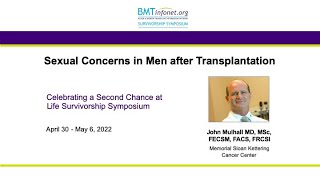Sexual Health after a Bone Marrow or Stem Cell Transplant
Changes in sexual health after transplant are common and can come as a surprise for both patient and partner alike.
Not everyone experiences these changes, but one study found that nearly 50% of men and 80% of women reported lower sexual activity five years after transplant. Sexual difficulties tend to persist or worsen overn time unless treated.
Sexual Difficulties in Women after Transplant
The sexual problems most often reported by women after transplant include:
- genital dryness
- pain during sex
- decreased interest/low desire
- decreased physical response/arousal
- loss of intimacy
The changes are usually caused by genitourinary syndrome menopause (GSM) or chronic graft-versus-host disease (GVHD). Problems with pelvic floor muscles can also cause pain with sex.
The first step to treating pain with sexual intercourse is to stop. Continuing with intercourse, despite the pain, can make the pain worse over time and reduce sexual desire.
There are various therapies available to address some of these problems including:
- vaginal moisturizers
- water or silicon based lubricants designed for intercourse
- hormone replacement therapy
- vaginal dilators
- topical steroids with estrogen, if the cause is vaginal GVHD
- surgical intervention for severe cases
Pelvic floor physical therapy is the gold standard treatment for pelvic muscles that are too weak or tense. Ask your doctor for a referral to a pelvic floor physical therapist or serach for one on Pelvic Rehab.
A sex therapist can help partners explore ways to achieve intimacy, despite changes caused by the transplant. You can get a referral to a sex therapist from the American Association of Sex Educators, Counselors and Therapists.
Sexual Difficulties in Men after Transplant
The most common sexual problem reported by men after transplant is erectile dysfunction. Other problems include:
- decreased interest in sex
- difficulty reaching orgasm
- pain with erection and climax
Therapies available that can improve sexual function in men include:
- oral medications such as Viagra® (Sildenaurethralfil), Levitra® (Vardenafil), Cialis (Tadalafil), and Stendra® (Avalafil).
- vacuum pumps and constrictive bands
- urethral suppositories
- intracavernosal injection therapy which increases blood flow to the penis.
- a surgically implanted penile prosthesis which can help you achieve an erection
- low-intesity shock wave therapy
If you are experiencing changes in sexual health after transplant, consider consulting with a sex therapist. These are professionals who are skilled at helping couples regain a comfortable sex life.
Ask your doctor for a referral to a sex or get a referral from the American Association of Sex Educators, Counselors and Therapists.




